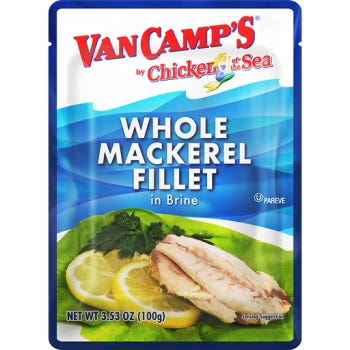Luthmann: At Brooklyn MDC, I Was a ‘Jailhouse Lawyer’ For Gangsters Paid in Fish
"Send Lawyers, Gangs, and Mackerel - The Shit Has Hit the Fan"
Luthmann’s favorite Warren Zevon song is “Lawyers, Guns, and Money.”
Luthmann encountered his own version of the Warren Zevon classic on the inside at the Brooklyn MDC: Lawyers, Gangsters, and Mackerel.
Read Luthmann’s lastest at the Frank Report (www.frankreport.com):
Luthmann: At Brooklyn MDC, I Was a ‘Jailhouse Lawyer’ For Gangsters Paid in Fish
Everybody in prison has a story. My story is I set up a “Law Office” in the Brooklyn Metropolitan Detention Center (MDC).
I literally went from being a “Lincoln Lawyer” on the street to being a “Jailhouse Lawyer” while in the custody of the Federal Bureau of Prisons.
I set up shop as soon as I walked into the MDC. I happened to meet a guy who was a reformed Russian mob enforcer. His name was Ruslan Reizin. He lived in Brighton Beach before his extended stay with the Feds. Rus is a Jew, born in the old Soviet Union. His family escaped to Israel, where he served in the army, and eventually found his way to Brooklyn. He spent a couple of decades being a general badass with a rap sheet to match, but he had since calmed down.
In Brooklyn, Rus had an awning cleaning business. He was on the straight and narrow until an employee he treated like a son abruptly left his company and began stealing Rus’ clients. Rus and his cousin took the former employee for a ride and tried to “scare” him into paying Rus “compensation.” They met each week, and Rus collected installments for what he believed he owed. The only problem was that the Feds had the former employee wired up. The Feds closed in. Rus kept his mouth shut, but his cousin sang like a canary.
So Rus landed in the MDC Brooklyn, and we became the best of friends. I recognized his “particular set of skills.” I said, “Listen, I’m a lawyer on the street. And you do collections. It’s a match made in heaven.”
Rus agreed, and the “Brooklyn MDC Law Offices” were formed. The division of labor was straightforward. l did the legal work; Rus did collections, crowd control, and protection. We split everything down the middle.
Once we got started, it was a challenge to get paid. Prisoners only got $170 every couple of weeks on the commissary. So our “clients” either had commissary to pay with or would want to send you money “on your books,” meaning on your prison commissary account.
The BOP monitors these accounts. Other inmates would have people on the outside put Western Union or cash onto their prison commissary for “products” or “services rendered,” which could range from gambling debts, drug purchases, protection, additional food and commissary items, and the like. If you get caught receiving money from someone who sent money to another prisoner, you can get a “shot” – a prison disciplinary ticket – and prompt an investigation. Rus would take money on his books. He ended up getting a couple of shots. They took away his Trulincs prison email a few times. It didn’t matter. Rus had me doing all his writing for him anyway.
The two forms of payment I took for my services were mackerel and postal stamps. Mackerel pouches or “mack” are the fundamental denomination of prison currency. Mackerel are basically bait fish for those on the outside. For prisoners, they are a staple protein. Macks come in little pouches and cost $1.00. I would also take books of forever stamps, which always have appreciable value.
I soon had a locker full of mackerels and began using the second locker in my cell to store my macks. When I got a cellie, I would pay them off in “rent” to store my fish in the locker. The stamps I sent home in birthday cards. Everyone seemed to have a birthday every month.
Things were running smoothly. Rus and I provided a valuable service to the prison community. Then, one day, things exploded.
You play a lot of cards in jail. Rus, the Russian, was my spades partner. We were playing against a couple of inmates who happened to be members of the Bloods gang. One of them, Gutter, said, “Yeah Rich, I got my plea deal. Could you take a look?”
I said, “Sure, bring it by. I’ll take a look at it for you as a professional courtesy.”
Gutter was shocked. “You’ll really help me like that?”
I said, “Yeah, no problem, just bring it by after we play cards.”
This was when Geoffrey Berman was the US Attorney for the Southern District of New York.
Gutter showed me the plea agreement his public defender sent to him.
I told him, “This is a ‘Dummy Plea.’ “
“Like what you mean?”
I said, “ ‘Like what I mean’ is you would be a dummy if you sign this. Berman’s trying to screw you.”
Gutter’s case was a drug case. I told him about Trump’s First Step Act. He was amazed that Trump’s new law reduced mandatory minimums and adjusted drug weight to account for the powder-crack cocaine disparity under the old law.

I told Gutter, “This plea says you will be sentenced AS IF the First Step Act never happened. That means that your drug weight and the mandatory minimums will put you in about a 15-year range for prison. With the First Step Act, you’ll only have to do about five if you get sentenced under the Trump amendments. The US Attorney is trying to screw you into ten additional years in prison.”
Gutter wanted to know why he had not heard about this from his Public Defender, and why his lawyer was pressuring him so hard to take the deal.
I said, “Because he’s a ‘Public Pretender.’ His job is: ‘Meet ’em. Greet ’em. And Plead ‘em.’ Fire him. He doesn’t give two shits about you.”
Gutter and I devised a plan to get somebody better, blow up the deal, and ensure the First Step Act amendments were respected in his Plea Agreement.
Gutter went to court a couple of days later, and he blew the deal. Using his best “Angry Black Man” tone, he told the Judge he knew he was entitled to the First Step Act, but the Government and his lawyer didn’t tell him.
“Why am I being railroaded?” Gutter asked the US District Court judge.
“Only a dummy would agree to this deal instead of rolling the dice. There’s not much worse than it can get than fifteen years, and are no bodies on my case,” Gutter said.
He said, “Is this some conspiracy to keep the black man down? I don’t want this guy. He’s fired. I want somebody who tells me what’s going on. I’m not getting fooled by these people. I’m not taking a deal from these people,” – meaning the US Government.
Gutter got another lawyer. They gave him a new plea agreement for a sentence of five years.
The reality is this is how the US Attorney transacts business with the Defender’s Office. For every Gutter, there are one hundred others who are rotting in prison because they were hoodwinked out of the rights the law affords them. Long live the legal fiction of effective assistance of counsel.
When Gutter returned from court, he was the happiest man on the face of the planet. From that day forward, I had the Bloods as my clients. I was basically general counsel for the Bloods at the Brooklyn MDC.
The Bloods are a street gang and a prison gang. When you’re on the inside, certain gangs run things. You often have to affiliate with a group for the benefits of protection – in prison lingo, you join a “car.” The gangs were their own prison “cars” and shot callers in jail.
The Bloods and the Crips are the main gangs for blacks. They ‘ran together’ as allies at the MDC with smaller gangs like the YGz (Young Gunnaz).
You also have Italians, and unless there is a specific beef, all the Italian Mafia families affiliate in prison. Strength in numbers.
The “haters” also do their own thing: Aryan Brotherhood, Aryan Resistance, and other similar names. I stayed away from them, and they stayed away from me. It probably helped because they thought since I was a lawyer, I was a Jew. I got along with most in prison, but those guys were repulsive. It is hard enough in prison to get along with the harsh conditions. To have a group of people seething with hatred, literally hating a majority of the inmates – who were black and brown – created a certain tension – in an already tense enough place. So I sought to avoid them.
You also had the Latin gangs, the most significant being MS-13 and the Latin Kings. Also, there were one or two Russians and Albanian gangsters. While formidable on the street, in jail, they weren’t enough of them to be a force. So they freelanced, much like Big Rus.
The Bloods were the biggest gang in the MDC. If you are in Brooklyn, Queens, Bronx, Northern Manhattan, and other areas with drug dealing and street crime, you have the Bloods. They run the show.
Once I had the Bloods as my clients, I had all the protection I needed. I also had a steady flow of work. I did not charge the Bloods or anyone the ‘shot-caller,’ Richard Michel aka ‘G-Light’ asked me to take care of. It was professional courtesy. For that, I received many benefits.
There was never a collection issue after that. My cell became single occupancy because it was now the “law office.” The Bloods told the head orderly that my room was the last room to get a cellmate. I lived alone in the MDC most of the time because I was doing legal work for the ‘right’ people.
If I had problems with anyone in the general population, they knew the Bloods had my back. Anything that Big Rus couldn’t take care of, any ‘beefs’ that might happen, were quashed immediately.
I would charge the Latin guys: MS-13s, the Latin Kings, and Puerto Rican drug dealers, and the white-collar guys that came through (but never any CHOMOs). That’s where I had a lot of fun, as much fun as you can on the inside.
But I must confess, since I’ve been back on the outside, I have not been able to look at, let alone eat, a single mouthful of mackerel. In fact, I won’t even use them for bait on my Floridan fishing excursions.
********************************************
A former attorney and former federal prisoner. Richard Luthmann is a writer and contributor for the Frank Report. He recently appeared on Peter Mingils and Scott Johnson’s radio show from whence some topics discussed in this post were amply discussed and enhanced by questions and comments.
Radio personality, Peter Minglis
Former Amway distributor, Scott Johnson
About the Author
Richard Luthmann is a writer, commentator, satirist, and investigative journalist with degrees from Columbia University and the University of Miami. Once a fixture in New York City and State politics, Luthmann is a recovering attorney who lives in Southwest Florida and a proud member of the National Writers Union.
For Article Ideas, Tips, or Help: richard.luthmann@protonmail.com or call 239-287-6352.
This is Satire? is a reader-supported publication. To receive new posts and support my work, consider becoming a free or paid subscriber.












